Under any other circumstances, I’d be grumbling that the White House needs to be more diplomatic and not share its doubts about countries we’re forced to worked with. But with Pakistan, why bother? They just got caught hiding the world’s most wanted terrorist and they weren’t even really “hiding” him. If not for their nuclear arsenal, we’d have declared them an enemy ages ago and either bombed them ourselves or heartily encouraged India to do so. Just because we have to play nice doesn’t mean we have to pretend.
So Panetta’s stopped pretending.
In his first interview since commanding the mission to kill Osama bin Laden, CIA chief Leon Panetta tells TIME that U.S. officials feared that Pakistan could have undermined the operation by leaking word to its targets. Long before Panetta ordered Vice Admiral William McRaven, head of the Joint Special Forces Command, to undertake the mission at 1:22 p.m. on Friday, the CIA had been gaming out how to structure the raid. Months prior, the U.S. had considered expanding the assault to include coordination with other countries, notably Pakistan. But the CIA ruled out participating with its nominal South Asian ally early on because “it was decided that any effort to work with the Pakistanis could jeopardize the mission. They might alert the targets,” Panetta says.
Matter-of-fact, just like that. We can’t inform our close regional partner that we’re launching a raid on the mastermind of 9/11 because … they might tip him off. Ho hum. This part’s even better:
That will raise questions about the Pakistani government’s possible awareness of bin Laden’s location in recent years. But one of Panetta’s predecessors says this can work to U.S. advantage. “It opens up some opportunities for us with Pakistan,” says John McLaughlin, former deputy CIA chief. “They now should feel under some great pressure to be cooperative with us on the remaining issues,” like going after the Taliban elsewhere in the country. “It’s called leverage.”
I’m mighty keen to hear more about this “leverage.” According to John Brennan, Bin Laden might have been living in the compound for five or even six years. Another official told ABC that the structure may have been built specifically for him. It’s located a few hundred yards from their national military academy — where U.S. troops have held training exercises in the recent past and where Pervez Musharraf used to jog — and yet it’s still almost unthinkable that they’ll be punished in any meaningful way lest they use their Taliban and terrorist proxies to hit India or further destabilize Afghanistan. For instance, despite the grumbling in Congress right now, does anyone seriously think we’re about to cut off military aid to Pakistan? Just last night on Greta’s show, John McCain argued that we should stick with them, keep the faith, continue nudging them towards democracy (which could be the ultimate destabilizing influence, given the demographics), etc. As long as they keep up the barest pretense of not willingly harboring the scummiest degenerates in the universe, Washington politicians will keep propping them up. That’s why they’re not even bothering to make sure their talking points are consistent: On the one hand, unnamed Pakistani officials are insisting that this was a joint operation while, on the other, President Zardari is claiming in an op-ed that it wasn’t. I swear, I’m half convinced that Bin Laden ended up in Abbottabad, in a military area, precisely because Pakistan wanted to signal to its jihadist element that he was well cared for if/when we ever caught him.
In fact, Panetta’s already revising what he said earlier to make it a bit softer on our trusted allies:
CIA Director Leon Panetta told House members Tuesday that any way you look at it, Pakistan’s role in Osama bin Laden’s whereabouts was troubling.
According to two sources in a closed door briefing, Panetta told lawmakers “either they were involved or incompetent. Neither place is a good place to be.”…
He made clear that he and other administration officials are trying to get to the bottom of which it was -involvement or incompetence.
Could it have been incompetence? Well, apparently, the Bin Laden family (if not Osama himself) was known to interact with local children. And their activities were sufficiently suspicious for one child to say in hindsight, “There was a rumour in the neighbourhood that the man who lived there was Baitullah Mehsud’s nephew.” Mehsud was a top Taliban field commander until he was liquidated in a U.S. drone strike two years ago; he was accused of, among other things, assassinating Benazir Bhutto, whose husband is now … president of Pakistan. If a rumor was circulating in this military town that a Mehsud family member was living there, one would think government officials might want to pay a visit to this strange, secretive compound and ask the inhabitants what they knew about Baitullah. And yet no one ever came knocking. For six years.
Here’s New Yorker writer Steve Coll marveling at the amazing brazenness of Pakistan’s complicity.
Watch the full episode. See more FRONTLINE.









Join the conversation as a VIP Member